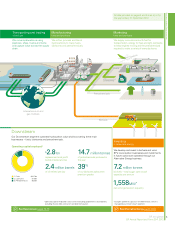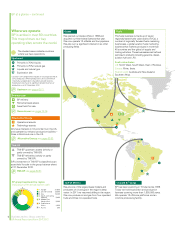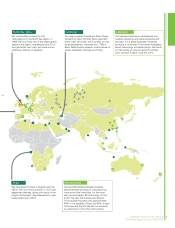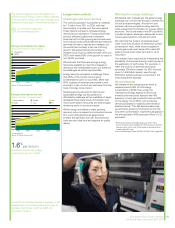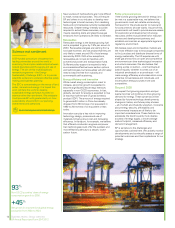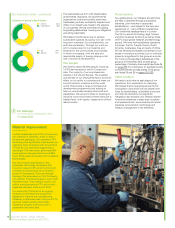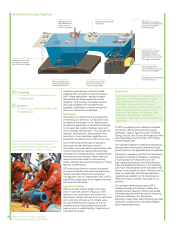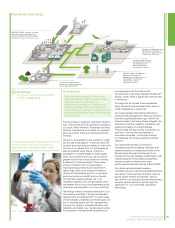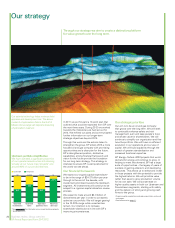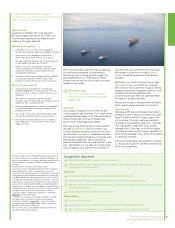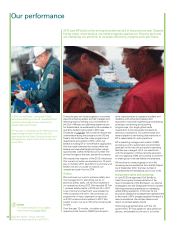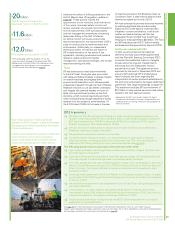BP 2012 Annual Report Download - page 16
Download and view the complete annual report
Please find page 16 of the 2012 BP annual report below. You can navigate through the pages in the report by either clicking on the pages listed below, or by using the keyword search tool below to find specific information within the annual report.
New sources of hydrocarbons are more difficult
to reach, extract and process. This will require
BP and others in our industry to develop new
technologies to boost recovery from declining
fields and commercialize currently inaccessible
resources. Greater energy intensity could be
required to extract these resources, which
means operating costs and greenhouse gas
emissions from operations are likely to increase.
Renewables
Renewable energy is the fastest growing fuel
and is projected to grow by 7.6% per annum to
2030. Renewable energies are starting from a
low base however, and we project that they are
only likely to meet around 6% of total energy
demand by 2030. With a few exceptions,
renewables are not yet competitive with
conventional power and transportation fuels.
Sufficient policy support is required to help
commercialize effective lower-carbon options
and technologies, but renewables will ultimately
need to become free from subsidy and
commercially self-sustaining.
Energy efficiency and innovation
While overall energy consumption is set to
increase, economic growth is expected to
become significantly less energy intensive,
especially in non-OECD economies. In fact,
globally, demand for energy is expected to rise
at less than half the rate of gross domestic
product (GDP). The amount of energy required
to generate $1 million in China has already
dropped from 350 tonnes of oil equivalent in
1980 to 200 tonnes of oil equivalent or less
today.
Innovation can play a key role in improving
technology design, process and use of
materials, bringing down cost and increasing
efficiency. In transport, for example, we believe
that efficient combustion engines and power
train technologies could offer the quickest and
most effective pathway to a secure, lower-
carbon future.
Policy, prices and access
If the world’s growing demand for energy is to
be met in a sustainable way, we believe that
governments must set a stable and enduring
framework for the private sector to invest and
for consumers to choose wisely. As part of this,
governments will need to provide secure access
for exploration and development of energy
resources; define mutual benefits for resource
owners and development partners; and
establish and maintain an appropriate legal and
regulatory environment.
We believe open and competitive markets are
the most effective way to encourage companies
to find, produce and distribute diverse forms of
energy sustainably. The US experience with
shale gas shows how an open and competitive
environment can drive technological innovation
and unlock resources. We also believe that
putting a price on carbon – one that treats all
carbon equally, whether it comes out of an
industrial smokestack or a car exhaust – will
make energy efficiency and conservation more
attractive to businesses and individuals, and
lower-carbon energy sources more cost
competitive.
Beyond 2030
We expect that growing population and per
capita incomes will continue to drive growing
demand for energy. These dynamics will be
shaped by future technology developments,
changes in tastes, and future policy choices
– all of which are inherently uncertain. Concerns
about energy security, affordability and
environmental impacts are all likely to be
important considerations. These factors may
accelerate the trend towards more diverse
sources of energy supply, a lower average
carbon footprint, increased efficiency and
demand management.
BP is sensitive to the challenges and
opportunities outlined here. We actively monitor
developments and continually assess a range of
potential outcomes and their implications for our
strategy.
93%
Non-OECD countries’ share of energy
consumption growth to 2030.
+45%
Net growth in unconventional global energy
production from 2020 to 2030.
Science not sentiment
A BP-funded consortium of experts from
leading universities around the world is
examining the complex relationships between
natural resources and the supply and use of
energy. The aim of this multidisciplinary
research programme – the Energy
Sustainability Challenge (ESC) – is to provide
scientific evidence to underpin effective policy
making and business planning.
The ESC is concentrating on the nexus of land,
water, minerals and energy. It is hoped this
work will help the world to develop
sustainable energy pathways founded on
science rather than sentiment. We anticipate
it will provide BP with greater clarity on how
sustainability should inform our planning,
investments and operations.
Business review: Group overview
BP Annual Report and Form 20-F 2012
14
bp.com/energysustainabilitychallenge



